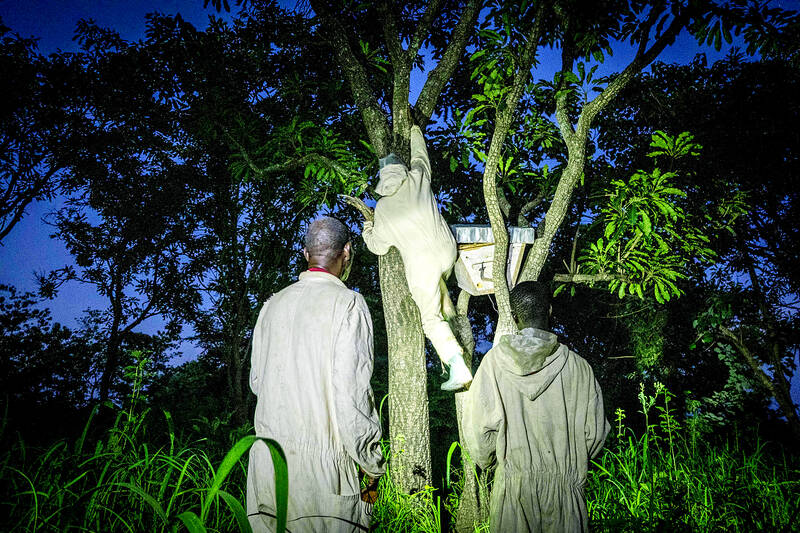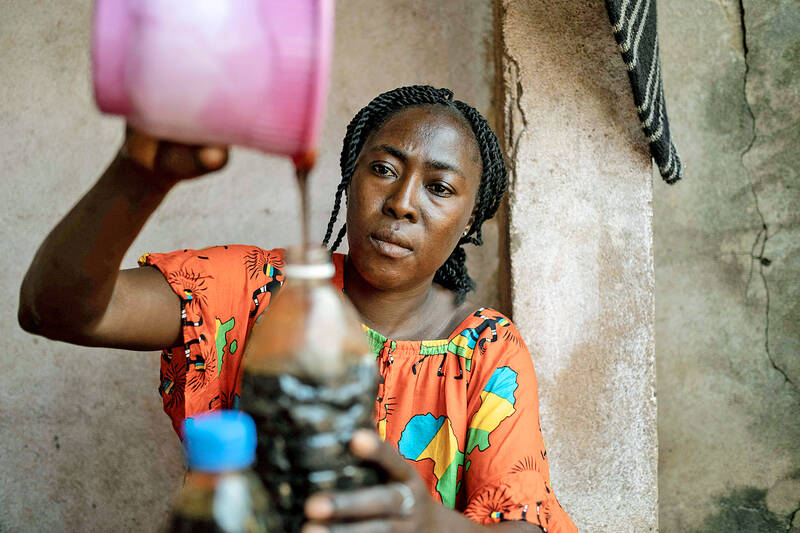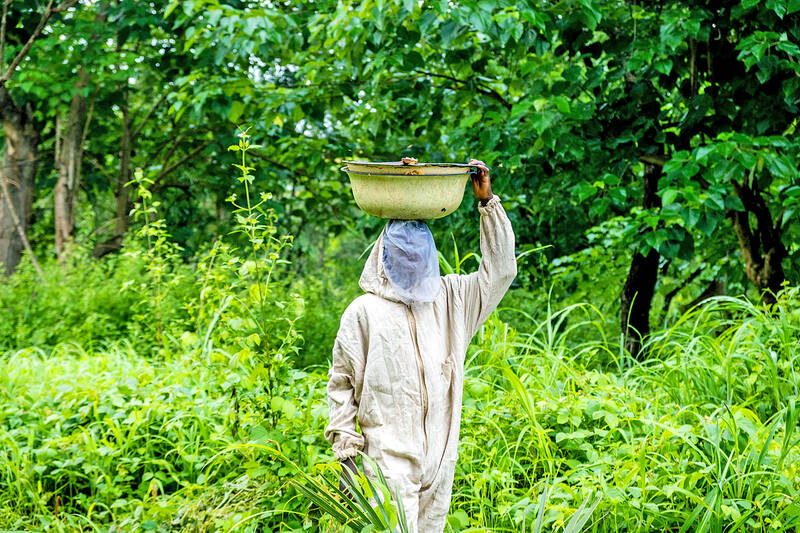Guided by the broad beam of a flashlight, four beekeepers softly tread toward a wooden hive atop a mango tree in Bossangoa, a town in northwestern Central African Republic (CAR).
The area boasts lush and varied vegetation which helps account for the prized fragrance of its renowned honey.
Relying on the darkness to calm the bees, the team dislodges the buzzing hive to extract some of the precious nectar.

Photo: AFP
The Central African Republic was the continent’s fourth-biggest honey-producing nation in 2020 and ranked 20th in the world, UN Food and Agriculture Organization data showed.
However, nine years of dwindling resources and a civil war that left producers cut off and isolated have hampered the sector.
“Before the crisis, we sold our honey to neighboring countries and to [the capital] Bangui,” said Philippe Mobompte, secretary general of CAPICO, the regional beekeepers’ cooperative. “It’s difficult now.”

Photo: AFP
As one of the team frantically pumps metal bellows, the smell of burnt, dry grass wafts through the air. Using smoke is an age-old technique to reduce the bees’ aggressiveness.
“In Bossangoa, there are many shea trees, mango trees, papaya trees, grapefruit trees, banana trees... This is what lets us have high-quality honey,” Mobompte said.
The cooperative is supported by the international nonprofit Action Against Hunger, which provides modern hives and equipment such as honey extractors and protective clothing for harvesting.

Photo: AFP
In his beige overalls, 64-year-old Mobompte — who has 20 modern and 25 traditional hives — reaches for the first batch of the glistening honeycomb cells.
One of the poorest countries in the world, the former French colony was plunged into civil war in 2013.
A Muslim-dominated rebellion overthrew then-CAR president Francois Bozize, sparking reprisals from predominantly Christian and animist self-defense militias.
The fighting peaked in 2018 and rebel groups controlled two-thirds of the country’s territory until early last year. Rebels tried to oust CAR President Faustin-Archange Touadera in late 2020 by launching an offensive on Bangui, but the army — with purported help from Russian mercenaries — repelled them.
However, the state still struggles to establish its authority in many remote areas of the vast nation.
Although the security situation has improved slightly in the past few years, conflict still affects communities farther away from Bangui, with sporadic fighting breaking out.
For Bossangoa’s beekeepers, the danger and upheaval has left its mark.
“I remember a period when Chadians, Cameroonians and Sudanese came to buy their honey here, but today consumption is low,” said Francine Webouna, 42, a honey trader in the Bossangoa market.
In February last year, Bossangoa, in the Ouham prefecture, was recaptured from rebels by the army.
Although calm has returned, the few hundred CAPICO beekeepers cannot venture far into the bush to further their operations.
“They might run into rebels who are still on the prowl,” Mobompte said.
He said that while “the armed groups never touched my hives, they looted and destroyed my house twice.”
“Taking the road to sell your honey is also dangerous, and expensive, because you can run into thugs and the taxes at the various checkpoints are high,” Mobompte added.
He is still marked by a recently assault on beekeepers from his cooperative as they headed to an agricultural fair.
Like the people he trains, Mobompte cannot live on the proceeds from honey.
“There are no outlets elsewhere and, locally, people do not consume enough of it. I am currently storing 200 liters of honey while waiting to find a buyer,” he said.
“A liter-and-a-half sells here between 2,000 and 2,500 CFA francs [US$2.97 and US$3.71],” the beekeeper said. “In the Central African Republic, it’s not a luxury product.”
Convinced of its quality, the cooperative’s members hope to branch out by processing their honey to manufacture derivative products.
In the current circumstances, that could prove a tall order.
“We could make food supplements, shoe polish, cosmetics and be recognized for this,” Mobompte said.
“But the lack of equipment, funds and knowledge do not facilitate this development,” he said, while mechanically wafting away bees around him.

The US dollar was trading at NT$29.7 at 10am today on the Taipei Foreign Exchange, as the New Taiwan dollar gained NT$1.364 from the previous close last week. The NT dollar continued to rise today, after surging 3.07 percent on Friday. After opening at NT$30.91, the NT dollar gained more than NT$1 in just 15 minutes, briefly passing the NT$30 mark. Before the US Department of the Treasury's semi-annual currency report came out, expectations that the NT dollar would keep rising were already building. The NT dollar on Friday closed at NT$31.064, up by NT$0.953 — a 3.07 percent single-day gain. Today,

‘SHORT TERM’: The local currency would likely remain strong in the near term, driven by anticipated US trade pressure, capital inflows and expectations of a US Fed rate cut The US dollar is expected to fall below NT$30 in the near term, as traders anticipate increased pressure from Washington for Taiwan to allow the New Taiwan dollar to appreciate, Cathay United Bank (國泰世華銀行) chief economist Lin Chi-chao (林啟超) said. Following a sharp drop in the greenback against the NT dollar on Friday, Lin told the Central News Agency that the local currency is likely to remain strong in the short term, driven in part by market psychology surrounding anticipated US policy pressure. On Friday, the US dollar fell NT$0.953, or 3.07 percent, closing at NT$31.064 — its lowest level since Jan.

The New Taiwan dollar and Taiwanese stocks surged on signs that trade tensions between the world’s top two economies might start easing and as US tech earnings boosted the outlook of the nation’s semiconductor exports. The NT dollar strengthened as much as 3.8 percent versus the US dollar to 30.815, the biggest intraday gain since January 2011, closing at NT$31.064. The benchmark TAIEX jumped 2.73 percent to outperform the region’s equity gauges. Outlook for global trade improved after China said it is assessing possible trade talks with the US, providing a boost for the nation’s currency and shares. As the NT dollar

The Financial Supervisory Commission (FSC) yesterday met with some of the nation’s largest insurance companies as a skyrocketing New Taiwan dollar piles pressure on their hundreds of billions of dollars in US bond investments. The commission has asked some life insurance firms, among the biggest Asian holders of US debt, to discuss how the rapidly strengthening NT dollar has impacted their operations, people familiar with the matter said. The meeting took place as the NT dollar jumped as much as 5 percent yesterday, its biggest intraday gain in more than three decades. The local currency surged as exporters rushed to